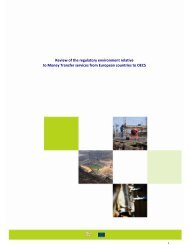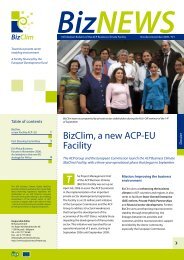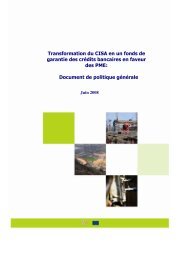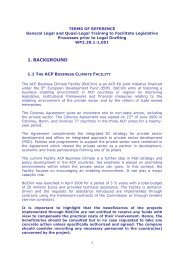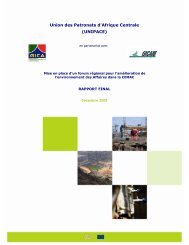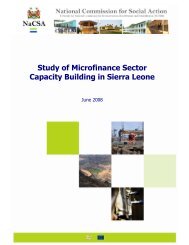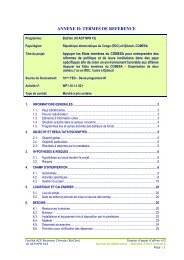(PPP) for Swaziland - ACP Business Climate
(PPP) for Swaziland - ACP Business Climate
(PPP) for Swaziland - ACP Business Climate
You also want an ePaper? Increase the reach of your titles
YUMPU automatically turns print PDFs into web optimized ePapers that Google loves.
Zodwa Mabuza<br />
<strong>PPP</strong> in <strong>Swaziland</strong> –<br />
a Private Sector Perspective<br />
Finally Zodwa Mabuza, the CEO of the Federation of<br />
<strong>Swaziland</strong> Employers and Chamber of Commerce, gave a<br />
private sector perspective on the issue of Public Private<br />
Partnerships in <strong>Swaziland</strong>.<br />
A <strong>PPP</strong> is a clear agreement of public infrastructure or<br />
public services delivery based on shared objectives but<br />
different goals. Both parties want enhanced delivery of<br />
infrastructure or services, but the public sector wants<br />
to leverage skills and resources of the private sector<br />
without shouldering all the risk while the private sector<br />
wants to contribute to enhanced service delivery via<br />
long term profitable contracts. A successful <strong>PPP</strong> needs<br />
a good working relationship and trust between the<br />
public and private sectors <strong>for</strong> the identification of<br />
mutually beneficial projects, specialised and independent<br />
professionals to evaluate projects and draw up<br />
contracts, a transparent and accountable procurement<br />
and tendering process and strong commercial courts<br />
<strong>for</strong> en<strong>for</strong>cement of contracts.<br />
In <strong>Swaziland</strong>, <strong>PPP</strong>s could close the infrastructure and<br />
service delivery gap. The private sector would become<br />
the driver <strong>for</strong> economic growth (instead of the Government<br />
that currently contributes 40 % to <strong>Swaziland</strong>’s<br />
GDP). Also, financial institutions would be required to<br />
invest more of their assets locally.<br />
Possible fields <strong>for</strong> <strong>PPP</strong>s are<br />
• Agriculture (e.g. irrigation systems <strong>for</strong> government<br />
owned farms);<br />
• Energy (e.g. electricity generation with independent<br />
power producers, renewable energy projects);<br />
• Health (e.g. construction of hospital laboratories,<br />
joint procurement of latest technologies / equipment);<br />
and<br />
• Construction (e.g. specialised factory shells).<br />
But several problems compromise the success of <strong>PPP</strong><br />
projects in <strong>Swaziland</strong>: The lack of transparency and<br />
accountability in procurement and tendering fosters<br />
corruption. The political and economic uncertainty<br />
makes planning <strong>for</strong> projects difficult and reduces their<br />
attractiveness. And finally, <strong>PPP</strong>s fail to be launched as<br />
there is limited trust between Government and the<br />
private sector.<br />
According to the private sector, the Ministry of Finance<br />
should hold thorough consultations on the <strong>PPP</strong> Policy<br />
Framework. A Procurement Bill needs to be passed<br />
into an Act so that it is binding to actors. Independent<br />
and well-capacitated commercial courts and an effective<br />
Anti-Corruption Commission should be established.<br />
Further capacity building, in addition to the current<br />
training programme, <strong>for</strong> both public and private sector<br />
personnel on <strong>PPP</strong>s is urgently needed.<br />
A few positive steps have already been taken: a draft<br />
<strong>PPP</strong> policy framework has been developed, a SADC <strong>PPP</strong><br />
network has been launched, re<strong>for</strong>ms to the procurement<br />
process have been initiated via the Public Procurement<br />
Bill of 2009, and an Investor Roadmap has been<br />
developed to introduce strong commercial courts and<br />
investor protection measures.<br />
The perspectives are also promising: The current fiscal<br />
position of Government and the plans <strong>for</strong> infrastructure<br />
development in the SADC region present an opportunity<br />
<strong>for</strong> <strong>PPP</strong>s. The Guidelines will serve as a base to <strong>for</strong>mulate<br />
an effective <strong>PPP</strong> policy, and several <strong>PPP</strong>s that<br />
have taken place without a framework indicate at<br />
least some level of trust between government and the<br />
private sector.<br />
9



